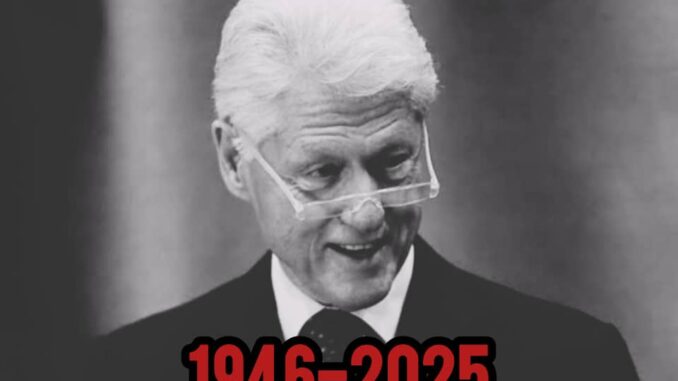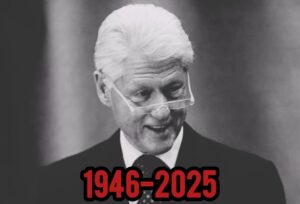
Breaking News: Former President of the United States, Bill Clinton, Confirmed Dead After a Serious Illness
In a somber and historic moment for the United States and the global community, former U.S. President Bill Clinton has been confirmed dead following a prolonged and serious illness. The 42nd president of the United States, whose political career and post-presidential endeavors shaped American discourse for decades, passed away earlier today at the age of 78. His death was confirmed by the Clinton family and a spokesperson from the Clinton Foundation.
This marks the end of an era for one of the most prominent political figures of the late 20th and early 21st centuries, a man who led the country through a time of unprecedented economic growth and global realignment.
A Nation in Mourning
The announcement of Clinton’s death triggered an outpouring of grief from across the political spectrum and around the world. Flags at federal buildings across the United States were ordered to be flown at half-staff by President Joe Biden, who referred to Clinton as “a statesman of rare charisma and strategic brilliance.”

In a heartfelt statement, Biden said:
> “Bill Clinton’s life was defined by his unyielding belief in the promise of America. He believed in the power of people and the power of democracy to build a better future. Today, we mourn the loss of a great American and a cherished friend.”
Vice President Kamala Harris, along with former Presidents George W. Bush, Barack Obama, and Donald Trump, also expressed condolences. Former Secretary of State Hillary Clinton, his wife and lifelong partner in politics, released a brief statement:
> “My heart is broken. Bill was my best friend, my partner, and the love of my life. He fought bravely until the end, and his legacy will live on through the many lives he touched.”
A Legacy of Triumph and Turbulence
William Jefferson Clinton, born William Jefferson Blythe III on August 19, 1946, in Hope, Arkansas, rose from humble beginnings to become one of the most transformative and polarizing presidents in American history. A graduate of Georgetown University, a Rhodes Scholar at Oxford, and a Yale Law School alumnus, Clinton’s intellect and political talent were evident from an early age.
He served as the Governor of Arkansas for over a decade before winning the presidency in 1992, defeating incumbent George H. W. Bush during a period of economic dissatisfaction. At age 46, he became one of the youngest presidents ever elected.
During his two terms from 1993 to 2001, Clinton oversaw a period of economic prosperity marked by job growth, budget surpluses, and technological advancement. His presidency saw the passage of landmark legislation, including the North American Free Trade Agreement (NAFTA), the 1994 Crime Bill, and welfare reform. Internationally, he presided over major diplomatic efforts, including the Oslo Accords and the Dayton Peace Agreement that ended the Bosnian War.
However, his administration was also marred by personal scandal. In 1998, Clinton became only the second U.S. president to be impeached, following revelations of an inappropriate relationship with White House intern Monica Lewinsky. He was acquitted by the Senate and remained in office, with his approval ratings remaining relatively high despite the controversy.
The Post-Presidency Years
After leaving the White House, Clinton remained a powerful figure in American and global affairs. Through the Clinton Foundation, he championed initiatives around public health, climate change, and economic development. His philanthropic work earned him accolades, though the foundation itself was not without controversy, especially during Hillary Clinton’s 2016 presidential campaign.
Clinton became a regular speaker at Democratic National Conventions and served as a key adviser and surrogate for Democratic candidates. Despite health challenges—including a quadruple bypass surgery in 2004 and hospitalization in later years—he remained active well into his 70s.
In his later years, Clinton authored multiple books and frequently gave speeches on leadership, globalization, and democracy. He was also known for his close friendship with former political rival George W. Bush, symbolizing a unique post-partisan bond that captivated many Americans.
Health Decline and Final Days
Clinton’s health had been a concern for years. In recent months, he had reportedly battled a serious illness, though the details had been kept largely private at the request of his family. He had been admitted to a New York hospital several weeks ago for what was described at the time as a “non-COVID-related infection.”
According to his family’s statement, Clinton passed away peacefully at home surrounded by loved ones. Medical professionals confirmed that he succumbed to complications related to the long-term illness he had been fighting for over a year.
The Clinton Foundation also issued a statement, saying:
> “President Clinton dedicated his life to public service and to building a better world. We mourn his loss but celebrate his unmatched legacy of compassion, leadership, and impact.”
Tributes Pour In From Around the World
International leaders from across continents expressed sorrow and paid tribute to Clinton’s legacy. Former British Prime Minister Tony Blair, who worked closely with Clinton during the 1990s, described him as “one of the greatest political leaders of the modern era, with a heart as big as his intellect.”
Canadian Prime Minister Justin Trudeau, French President Emmanuel Macron, and United Nations Secretary-General António Guterres also issued statements honoring Clinton’s contributions to peace, diplomacy, and global development.
In South Africa, former President Thabo Mbeki recalled Clinton’s role in expanding global HIV/AIDS treatment and support through PEPFAR (the President’s Emergency Plan for AIDS Relief), describing it as “one of the most humane and enduring gifts from any American leader to the people of Africa.”
A Presidential Funeral Ahead
Preparations are underway for a state funeral, which is expected to be attended by world leaders, former presidents, and dignitaries from across the globe. The funeral will be held at the National Cathedral in Washington, D.C., with public memorials planned in Little Rock, Arkansas—home to the Clinton Presidential Library.
Security is being heightened in preparation for the high-profile event, which will include eulogies by President Biden, former President Obama, and other key figures in Clinton’s life. It is expected to be one of the largest gatherings of current and former leaders in recent U.S. history.
An Indelible Mark on America
Bill Clinton’s death closes the chapter on a political giant whose influence touched nearly every aspect of modern American life—from economic policy and race relations to international diplomacy and cultural transformation.
His ability to connect with ordinary people earned him the nickname “The Comeback Kid,” while his political strategy and centrist ideology helped reshape the Democratic Party. Yet he also faced significant criticism, from both progressives and conservatives, for decisions that continue to reverberate through American society.
Few figures in American history have been as consequential or as controversial. But even his harshest critics acknowledged Clinton’s unmatched skills as a communicator, negotiator, and leader.
As the nation prepares to say its final farewell, it is clear that William Jefferson Clinton’s legacy will endure—etched into the annals of American history, in the institutions he shaped, and in the millions of lives his policies and actions influenced.
Leave a Reply